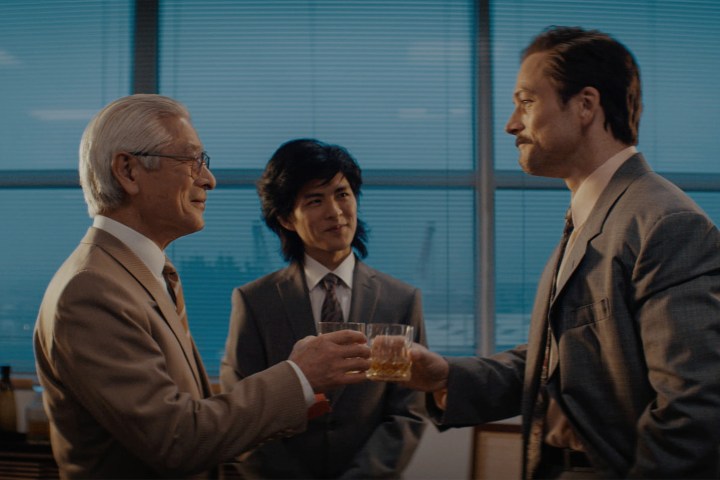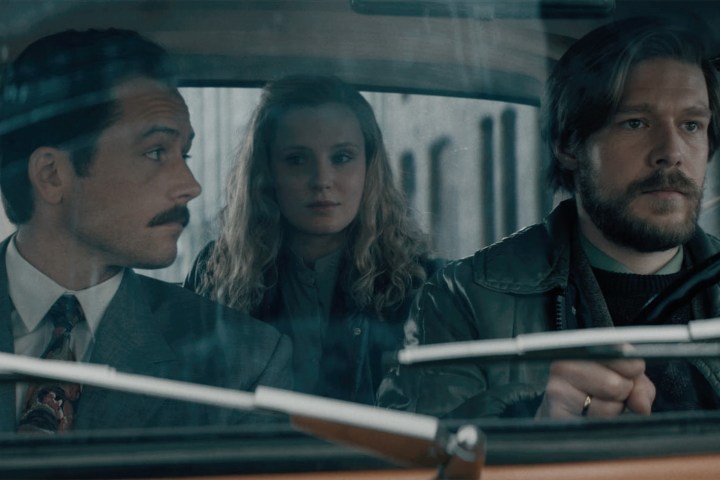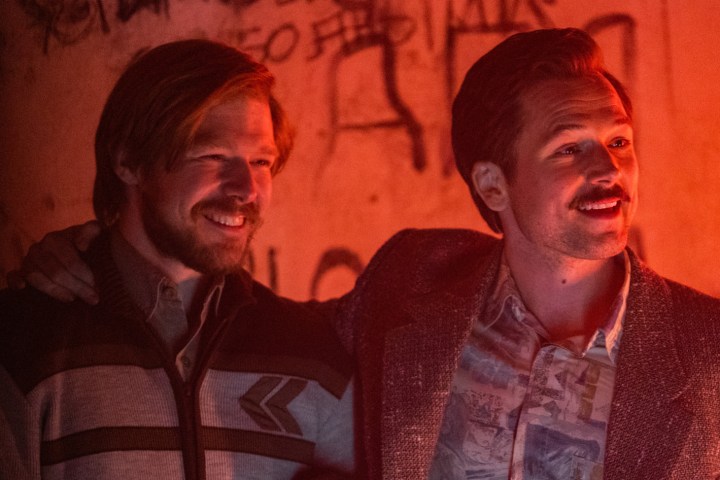“Apple TV+'s Tetris is a breezy, easy-to-watch political thriller that's undeniably entertaining, even if there isn't much going on beneath its surface.”
- Taron Egerton's charismatic lead performance
- A brisk, unrelentingly fast pace
- Several outlandish set pieces and twists
- A forgettable, if fun, script
Tetris is a sleek, well-directed political thriller that rarely ever takes itself too seriously. The film is, in other words, a perfect addition to Apple TV+’s growing library of movie and TV originals. With its true-story premise and cast of more-than-game on-screen players, the latest directorial effort from Filth and Stan & Ollie director Jon S. Baird also feels, much like the popular video game it’s named after, like a product of another era. The film provides such simple pleasures, in fact, that it’s easy to imagine it playing on movie theater screens across the country just 10 or 20 years ago.
Fortunately, while its placement on Apple TV+ does add a layer of irony to its story about an 8-bit 1980s video game, Tetris still works as well on the small screen as it likely would have in a movie theater. Clocking in at just under 2 hours long, the film doesn’t require too much of an emotional or intellectual commitment to make the thought of pressing play worth deliberating over for long. In that sense, the film is an effective homage to its video game namesake. That is to say that the film is easy to turn on and get lost in without realizing until it’s done that you’ve just devoted 2 hours of your time to it.

Based on real-life events, Tetris follows Henk Rogers (Black Bird‘s Taron Egerton), a Dutch-American entrepreneur based in Japan whose life is turned upside down when he is given the chance to play a brand-new video game about falling blocks called Tetris at a 1980s video game convention in Las Vegas. Intent on securing the Japanese distribution rights to the game, Henk quickly begins taking meetings with the executives over at Nintendo and making prophetic — if potentially reckless — promises to his investors and family members, including his wife, Akemi (an underused Ayane Nagabuchi).
Henk’s plans for worldwide video game domination begin to go awry, however, when he discovers that there are questions over the legitimacy of his control of the Japanese rights to Tetris. Determined to make sure that he doesn’t lose out on a chance of a lifetime, Henk travels to the Soviet Union himself in order to not only meet Tetris creator Alexey Pajitnov (Nikita Yefremov), but also convince Alexey’s superiors that selling the rights to a piece of Russian property to an American businessman is in their best interests. Unfortunately for him, Henk quickly meets opposition from both Alexey’s corporate bosses and his greedy, underhanded political superiors.
From there, Noah Pink’s script for Tetris quickly evolves from a jargon-heavy story about behind-the-scenes business operations and deals into a full-blown Cold War thriller. For the most part, Tetris manages to nail its midpoint transition, too. There are moments throughout its second half, however, where the film’s espionage twists and set pieces — namely, a third-act car chase through Moscow — begin to strain the movie’s admittedly lightweight sense of logic and real-world credibility.

The film, thankfully, moves at a shockingly brisk pace from the moment it begins all the way until it ends. Its opening 10 minutes effectively establish all the necessary information that viewers need to know about the rights disputes that provide Tetris with much of its drama by cutting backfand-forth between Henk’s conversation with a skeptical banker and the events that put the film’s titular game on his radar in the first place. Once the movie’s introductory exposition dump is done, Pink’s screenplay then wastes little time diving headfirst into the Cold War politics that made putting Tetris on the world stage a surprisingly difficult thing for Henk and his allies at Nintendo.
At the center of all of the film’s drama is Egerton, who brings so much energy and charisma to his performance as Tetris’ central businessman that it’s easy to get just as swept up in Henk’s dreams about the future as so many of the movie’s other characters. While Egerton manages to bring a commendable level of authenticity and realism to even Henk’s most naïve moments, the film’s attempts to flesh out his home life aren’t as successful. One subplot involving Henk’s strained relationship with his daughter, Maya (Kanon Narumi), for instance, isn’t explored enough for Tetris to place as much emphasis on it as it does.
Outside of Egerton’s Henk, many of Tetris’ supporting characters come across as flat or one-note. Sometimes that seems to be by design, as is the case with the film’s depiction of its central villain, a Russian politician named Valentin Trifonov (Igor Grabuzov). Other times, the film’s attempts to add dimension to supporting characters like Sofya Lebedeva’s Sasha, a Russian citizen who volunteers early on to translate for Egerton’s Henk, don’t end up carrying much weight.

Altogether, these flaws prevent Tetris from leaving much of a lasting impression. They don’t, however, drag down the film’s entertainment value. In fact, Tetris clips along at such a pleasingly fast pace and manages to bring enough life to its familiar but nonetheless engrossing Cold War plot that it easily ranks as one of the most watchable movies that’s been released so far this year. Behind the camera, Baird and cinematographer Alwin H. Küchler bring a polished aesthetic to the film that only makes it that much easier to take in — even if its various uses of 8-bit-inspired VFX don’t quite work as well as Baird and company may have hoped.
Ultimately, Tetris does a good job of not only exploring the surprisingly intense true-life story behind its eponymous video game, but also honoring the spirit of it. At no point throughout its 118-minute runtime does the film ever feel the need to overcomplicate itself or get too lost in the minutiae of its story. Instead, Tetris ends up delivering a simple but enjoyable experience — one that prioritizes entertainment over everything else. That fact may prevent Tetris from ever conjuring any real sense of emotional or political depth, but it does ensure that watching the film is never anything but a good time.
Tetris is available to stream now on Apple TV+.




